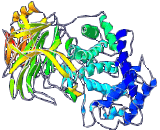Hyaluronidase intracellularly degrade hyaluronan, one of the major glycosaminoglycans of the extracellular matrix. Hyaluronan is thought to be involved in cell proliferation, migration and differentiation. This enzyme is active at an acidic pH and is the major hyaluronidase in plasma. Mutations in this gene are associated with mucopolysaccharidosis type IX, or hyaluronidase deficiency. Hyaluronidases may play a role in cancer metastasis. It has been hypothesized that by helping degrade the extracellular matrix (ECM) surrounding the tumor, hyaluronidases help cancer cells escape from primary tumor masses. Hyaluronidases are also thought play a role in the process of angiogenesis, although most hyaluronidase preparations are contaminated with large amounts of angiogeneic growth factors. As previously mentioned, there are six hyaluronidase genes in the human genome, four of which can express active hyaluronidases.

